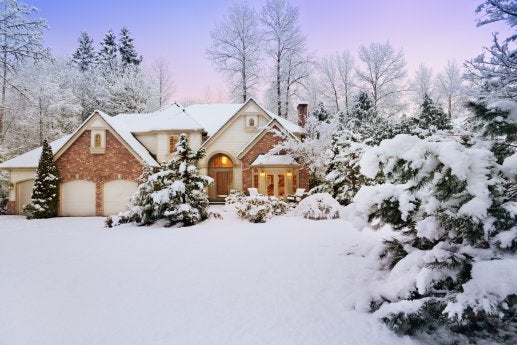-
3 Ways the Cold effects your Garage Door
Weather can have different effects on your garage door based on the temperature, precipitation, and how both fluctuate. Here are the 3 ways the cold effects your garage door and what you can do to prevent the problems associated with them.
Problem #1: Steel Contracts
Garage Doors (mostly made of steel) contract in the cold weather. Anything on your garage door that’s made of metal (springs, hinges, track, etc.) can seize up or warp if not moved regularly in the cold.
So, that is why we suggest lubricating things like springs, hinges, rollers and other metal moving parts to keep them working properly. Regular maintenance is an important part of having a functional garage in your home.
Problem #2: Water freezes
The bottom of your garage door seals to the ground in an attempt to block weather and rodents. However, during the winter months when water freezes, this can create a problem if there is any sort of puddling at the bottom of your garage door. Some garage doors can freeze to the ground and will not open if this happens.
To help prevent this, make sure your gutters and any other part of your home surrounding the door is clog free and push away water from the bottom of your garage as much as possible!
Problem #3: Operator Issues
Garage door operators are also susceptible to changes in weather. The moving parts enclosed in garage door openers work best when lubricated and are kept moving regularly (especially during the winter months). In addition, your opener’s sensitivity may also play a factor, if the level is set to “light”. In this case, your operator may interpret the garage door hitting an object, which could halt the garage door suddenly (without anything being in the way at all).
Please make sure you check your operator sporadically to make sure it’s working properly and sensing items through the photo eyes like it should.
Thomas V. Giel Garage Doors serves a 50-mile radius around Pittsburgh. We handle all your needs when it comes to garage doors! We serve residential and commercial , and our maintenance programs help make sure your garage doors work over long periods of time. Contact us today.
-
Polyurethane vs Polystyrene for Garage Door Insulation
Insulation in your residential or commercial garage door is essential if you want to make sure you keep the cold temperatures out of your house. There are two main types of insulation which are Polyurethane and Polystyrene.
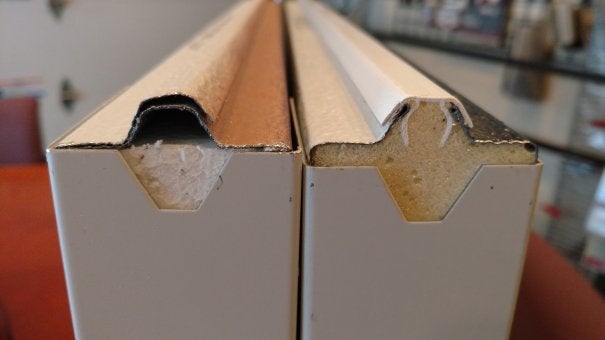
Polyurethane
Polyurethane (right) is a polymer composed or organic units joined by urethane links. They were first made by Otto Bayer and his coworkers at IG Farben in Leverkusen, Germany in 1937. It is mostly used in construction, car seating, and furniture but it is used in many other applications.
Polyurethane is sprayed into each panel and makes a very tight fit which will add to the rigidity of the panel when it is new giving it a higher R-Value .
Polyurethane is the more expensive material of the two but doesn’t usually add too much more money to the price of the door. It is important to make sure that the steel skins of the door are not too thin because two things could happen. One, the door will dent easily or two, small waves will appear across the sections and can generally be seen within five feet. This will obviously make the door not look so hot.
Polystyrene
Polystyrene (left) is a synthetic aromatic polymer made from the monomer styrene which is also known as Styrofoam. It is the white brittle material that is frequently used in shipping to protect the goods inside.
Polystyrene is pre-formed to the steel panels and is usually glued to both the front and back of the inside of the panel. It maintains it shape and fits better than open cell polyurethane over a long period of time and does not degrade, deform, or lose R-Value. Most manufactures use closed cell polyurethane negating many of the positives mentioned.
Polystyrene does not fit as tightly as the urethane foam in the end corners of each panel, leaving air pockets. Some manufacturers do not glue their polystyrene to the panels so it does not add to the stiffness of the panels. Generally, this foam results in a lower R-Value for the door.
Of the two materials, polyurethane is the better material. It does have a slight price increase and it’s up to you to decide if it is worth it or not. Regardless, getting insulation is a good choice no matter which material you use.
Thomas V. Giel Garage Doors serves a 50-mile radius around Pittsburgh. We handle all your needs when it comes to garage doors! We serve residential and commercial, and our maintenance programs help make sure your garage doors work over long periods of time. Contact us today!
-
8 Questions to ask about your Garage Door Company
A garage door is a big purchase (literally) and it’s important to choose the right company to install your door and provide service for years after you buy it. Here is a list of 8 questions to ask about your garage door company before you buy from them.
1. Does the company offer more than one manufacturer?

There are many manufacturers of garage doors across the industry and its important to have variety when deciding which door is best for you. This gives you the most options in terms of styles, material, color, and customization options. A few examples of manufacturers are: Clopay, CHI, Wayne Dalton, and Amarr. If a company only supplies one manufacturer, ask why that is. There could be a scenario of the company getting a kickback if they only offer one vendor (which is an unethical business practice).
2. Have you been advised to visit the company’s and manufacturer’s website?
It is important to do you research on the installation company and the manufacturer of the door to make sure you are being given applicable and truthful information. The door could be produced poorly or the installers could have a bad reputation for mounting the garage doors improperly in your home. This is also good practice to verify that the installers are telling you what the manufacturers intended.
3. Have they informed you about R-Values and what they mean?
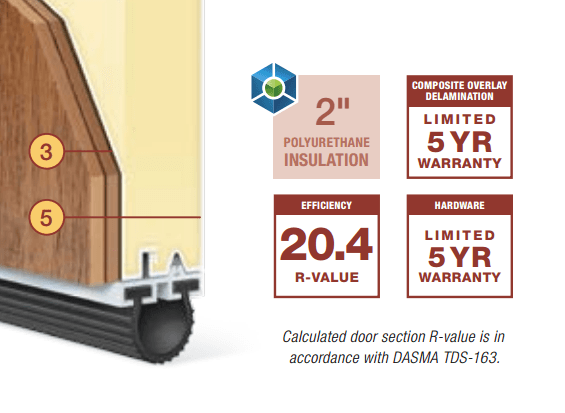
R-Value is one of the numbers used to describe how energy efficient a door is. Most manufacturers will display the sectional R-Value and not the installed R-Value which are completely different. Sectional is for one piece of the door and installed is for the whole door. Another misconception is that a double R-Value does not mean it is doubly efficient.
4. Does the company comply with all regulations?
The company and employees are required to adhere to all state and federal guidelines and certifications. These include building codes, the Occupational Safety and Health Administration (OSHA), and the Environmental Protection Agency (EPA). Companies that don’t comply with all regulations could be using unsafe practices while installing doors which can lead to injury for themselves or you if the door is installed incorrectly. There may not be a problem immediately, but something could happen after a year or two
5. What kind of employees are working in your home?
The important thing to discover with this question is how well trained the employees are working in your home. Are they full-time employees of the company or they sub-contractors? Are they trained properly? Such as, have they done on-site training? hands on training? or have they attended conferences with the manufacturers to learn best install techniques? Try to find installers who have the most experience installing the doors and operators in your area to get the best possible service.
6. Are the employees trusted and have your safety in mind?
Garage door safety is important for you, your family, and anyone going inside your garage. These are large pieces of metal or wood and they weigh quite a bit. This is why it is imperative that your installers are dedicated to making sure that safety is a number one priority during the installation and after the job is done. You wouldn’t want the door to come lose, or fall, possibly smash your car or even worse a person. Look for installers that have a long track record with employees that have years of experience installing garage doors & use safe techniques.
7. What kind of mounting hardware will be used?
Quality mounting hardware is essential for a proper garage door installation to ensure safe, smooth, and quite operation. Some companies will cut corners to save money or offer lower prices but this can lead to more problems down the road and won’t be worth the small amount of money you will save when you buy the door initially. You get what you pay for in this industry and if your door is mounted with poor hardware, that can increase the safety concerns & functionality of the doors.
8. Have you received any guarantees or warranties?
A company that stands behind its products and labor goes a long way to building trust with customers. Make sure you receive a written guarantee and warranty on the parts and labor directly on the estimate sheet or work order. If a company doesn’t back up its work, how will you know the safety or manufacturer guidelines were met or not?
Thomas V. Giel Garage Doors serves a 50-mile radius around Pittsburgh. We provide residential and commercial garage doors, entry and storm doors, awnings, and screens. With over 65 years of service, we are the experts you can trust in this industry.
-
Garage Door Material Guide
When shopping for a garage door there are four main types of materials to choose from. It is important to be an informed consumer when making large purchasing decisions. Therefore, here is everything you need to know about the pros and cons of each material.
Steel
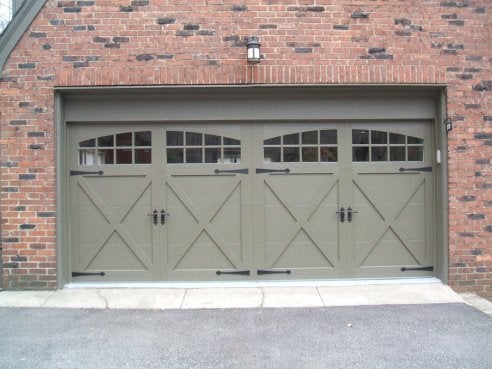
Steel has a long track record of being used in garage doors since the 40s. Steel doors are stronger and resist twisting and kinking better than other materials.
When looking at a steel door, the most important part is its gauge. The lower the gauge number, the thicker the steel and the more resistant the door will be to dents. Always try to get a door with a 24 gauge.
Some manufacturers will not mention the thickness or will say “nominal” gauge. This means that the door is 30 gauge which is not what you want. You should never buy a door with a gauge higher that 27 as this is the recommended thickness to give you any lasting durability.
The only cons to using a steel door would be dents from hitting the door too hard and possible rusting if the door is not properly maintained by washing the door twice a year. They are the most popular door for use in both residential and commercial applications.
Vinyl
Vinyl doors have been out for around 20 years, but because of low customer satisfaction many installers have stopped selling them. Vinyl is much more elastic than wood or steel which means it expands more in warm temperature and shrinks more in cold temperature.
If you live in an area with variable temperatures and legitimate seasons, you should never consider vinyl because over time the front of your door will be in bad shape with holes and warping.
You should only consider a vinyl door if you live in an area where it is consistently warm and weather changes are not common.
Wood
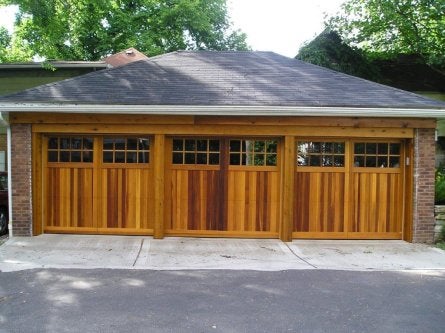
From the early 50s through the mid-80s, wood doors were most common. They were usually constructed with horizontal wooden rails and vertical styles making a framework to hold floating Masonite (particle board) panels.
After taking a dip in popularity, wood is coming back as a popular option today. Some doors are combined with steel and other have wooden panels with insulation in between.
Wooden doors are considerably more expensive than other materials and take much more to maintain. Staining and painting is required consistently every two to four years.
Despite this, the aesthetic appeal and warm feeling of a wooden door is unsurpassed.
Fiberglass
Fiberglass doors have been around for over 25 years. Using a heavy gauge fiberglass, these doors can come pre-finished in a specific color or stain or they are available in a “stainable” version allowing you to stain the door in whatever color yourself.
Modern fiberglass doors have steel frames and insulation sandwiched between the front fiberglass skin. They can have a realistic wood-like appearance but don’t have the price premium that wood doors currently have. However, fiberglass doors do require a clear coat resealing every one to three years for proper maintenance.
In conclusion, steel doors are the most reliable, have the least amount of maintenance, and are the cheapest of all the materials. Vinyl doors are not recommended unless you live in an area where it is always warm. Wooden doors are the most expensive and require a lot of maintenance, but they have the best aesthetic appeal. Fiberglass can give you the look of wood for less money but still has more maintenance compared to a steel door.
Have more specific questions about a material? Let us know in the comments!
Thomas V. Giel Garage Doors serves the greater Pittsburgh area in all things garage doors. We have maintenance programs for both commercial and residential to keep your doors working like new.
-
Garage Door Weather Trim Guide
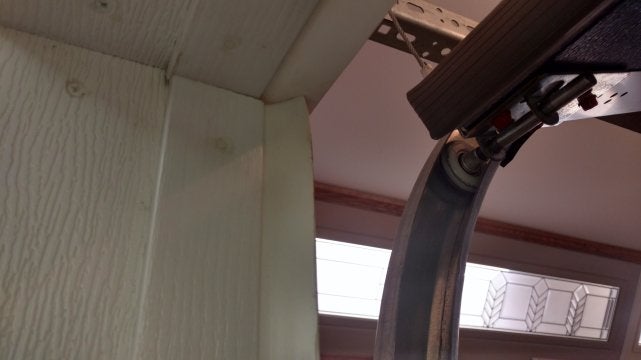
Overview
Garage door weather trim is the seal between the door and the frame and it is made out of a flexible material as to ensure a snug fit between the two. The trim is an integral part of the way the door fits and maintains the temperature inside your garage. It is essential for both residential and commercial doors.
It should be installed so that it fits snugly against the door. It will not be air tight because the door still must be able to move up and down. However, the outer edge should be caulked against the building and should match the trim or the building exterior.
If you don’t seal the door properly, you will lose heated or conditioned air from your garage when the door is closed. Similar to R-Value of the door itself, the weather trim is designed to make the door as energy efficient as possible.
Installation
Weather trim comes in different sizes; normally 2” in width but you may have to use 3” trim depending on your door and how far away it is from the frame. If you have “fancy” corners on your garage, your installer should make trim adjustments.
A good installer will point out the adjustment and will place the trim behind the false corners making sure that the trim fits around the sides and top of the door. Verify that your door installers include the weather seal and the color matched caulking in his pricing.
Have a question about weather trim on your garage door? Let us know down in the comments.
Giel Garage Doors serves the greater Pittsburgh area in all things garage doors. We also have maintenance programs to keep your doors working like new after years of use.
-
Repair or Replace your Garage Door Checklist
Getting a new garage door is awesome! It opens quietly, provides light to your garage, and makes your house look spectacular. Despite that, over time your garage door will become sluggish, start to be louder, and may make you house look worse!
We don’t want you to worry about all of that so we created a checklist so you know when it is time to get your garage door repaired, serviced , or completely replaced. This checklist will work with residential and commercial garage doors.
Here is a picture of the checklist and a link to download below.
.jpg)
Save this checklist and go through it every three months to make sure your door is running the best that it can. If you have any of the symptoms on the list, please give us a call! Our best deal is the Annual Residential Maintenance Program which services your doors once a year for 3 years and its only $198!
Giel Garage doors serves the greater Pittsburgh area for all things garage doors. We do commercial and residential services.
-
3 things you need to know about R-Value
When shopping for a new garage door , one of piece of information that it touted around by the manufacturers is R-Value.
R-Value is a commonly used measure of an insulation material’s ability to resist the conductions of heat flow. While this is a fine piece of information to know, how much does it affect your door and what should you know in order to make the best decision possible regarding your door?
Here are the three most important things you need to know about R-Value.
1. Published R-Values are Deceiving

When a manufacture publishes a specific R-Value for their garage door, you must take that number with a grain of salt. Why?
Because manufacturers test this under controlled conditions in a laboratory, or a static test. They test one piece of the door in its center, not the whole door through the gaps where the heat loss would be the greatest.
Architectural Testing Inc., an independent laboratory, tested R-Value on seven different installed garage doors. They found that the installed R-Value is 35% to 65% of the manufacturer’s published R-Value.
2. Doubling the R-Value doesn’t double the insulation
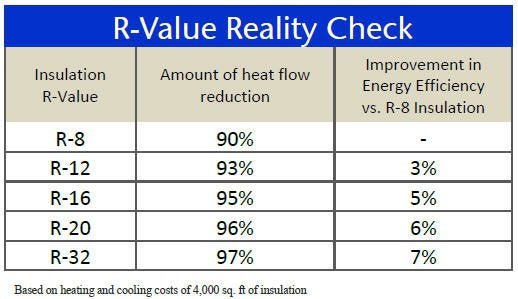
As R-Values get higher, the number does not have a one-to-one ratio to the amount of heat flow reduction. As you can see from the chart above, doubling your R-Value from 8 to 16 only gives you a 5% increase in heat flow reduction.
Don’t be fooled thinking that a high R-Value will give you significantly better insulation compared to a door with a slightly lower R-Value. It will be better, just not double better.
3. Don’t choose a door because of R-Value
Only looking a R-Value is a terrible way to decide which door is the right door. When considering energy efficiency, make sure you consider factors such as tightness of fit in the opening and proper seals and caulking. These all affect heat loss and should be evaluated on top of the R-Value.
Ask for the installed R-Value of the door which will give you better impression of how energy efficient the door will be. Always make sure you get professional installation of your door to ensure that your door will be as heat saving as possible.
Have any more questions about R-Value, energy efficiency, or how to shop for a garage door ? Let us know down in the comments and tell us what other kinds of content you want published! Click here to learn more about our company!
Giel Garage Doors services the greater Pittsburgh area selling residential garage doors. We also provide maintenance for all of the doors we sell.

